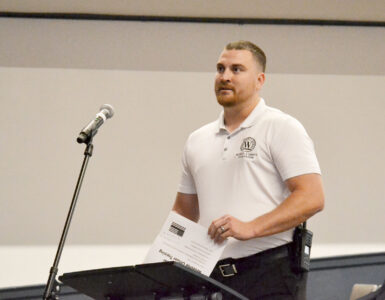PSC order requires cost-sharing for pole replacements for broadband expansion
CHARLESTON — Disagreements between the companies that own utility poles and internet service providers have plagued the expansion of broadband across the state, but a new order from the West Virginia Public Service Commission could help spread out the costs of pole replacements.
The PSC issued an order Tuesday requiring cost-sharing among all new pole attachers and the owner of the pole being replaced, updating its own pole attachment rules.
“Simply put, the Commission concludes that utility actions related to pole replacements must be just, reasonable and not unduly discriminatory,” according to the order. “Considering the arguments we have heard it appears that utilities are not considering the justness and reasonableness of their failure to allocate costs for pole replacements among all beneficiaries of the replacements.”
The pole attachment issue has been one of the central issues surrounding broadband expansion in the state, with Bridgeport-based Citynet in a dispute with Akron-based FirstEnergy subsidiaries Mon Power and Potomac Edison, and Comcast in a dispute with Columbus-based American Electric Power subsidiaries Appalachian Power and Wheeling Power.
In a July order, the PSC prohibited Appalachian Power from enforcing a “pre-existing violation” policy to place the cost of repairs or replacement of utility poles on internet service providers, instead of the electric utility that owns the poles. Appalachian Power has cited its pre-existing violation policy when issues are discovered with the pole or prior attachments to the pole during make-ready, the process of modifying utility poles for new internet service provider (ISP) equipment.
Current laws prohibit pole owners from denying access to utility poles to new attachers, such as ISPs, due to safety concerns stemming from pre-existing code violations caused by other attachers.
A 2023 order issued by the Federal Communications Commission (FCC) also determined that pole owners cannot charge new attachers for replacements of utility poles due to pre-existing conditions on the pole, if the pole is already scheduled for replacement or if the pole is non-compliant with safety standards.
“Just as the FCC has moved from a position that often forced a single new attacher to pay entire pole-replacement costs to a clarified, beneficiary-based approach that considers all attachers and the owner as beneficiaries, we clarify that pole owners should institute procedures to fairly share the cost of new poles among all attachers,” the PSC said in its Tuesday order.
“We leave it to the utility whether that involves a direct allocation of a one-time charge for a fairly allocated share among all users of the pole replacement cost or a modification in the pole attachment rental rates or some alternative or combination thereof,” the order continued.
The PSC issued an order on June 27 establishing a Pole Attachment Working Group to address various issues, including make-ready timelines, cost allocation and rule updates. The commission mandated the creation of a pole inspection database to aid broadband providers, contingent on funding, and required pole owners to file annual reports on attachment requests. The order also addresses specific rule modifications, such as allowing temporary pole attachments during pole replacements.
West Virginia is already a whole construction season behind due to delays in the federal Broadband Equity, Access, and Deployment (BEAD) program. The U.S. Department of Commerce’s National Telecommunications and Information Administration (NTIA) released updated guidance in June for BEAD, established by the 2021 Infrastructure Investment and Jobs Act (IIJA) to allocate more than $42 billion to expand high-speed broadband access across the United States.
Tuesday was the final day for the public to provide comments on the state’s final BEAD proposal being submitted to the NTIA. According to the draft final proposal, the West Virginia Office of Broadband within the state Department of Commerce will award $625 million of the $1.2 billion BEAD grant to nine provisional subgrantees to expand high-speed broadband to 73,701 locations across the state. The BEAD Final Proposal will be submitted to NTIA on or before Wednesday, Sept. 3.
According to federal BEAD requirements, applicants must deploy the planned broadband network and begin providing service to each customer that desires broadband service within the project area no later than four years after the date on which the applicant receives a BEAD award by the Office of Broadband.
Broadband projects funded through the federal American Rescue Plan Act (ARPA) must be spent by Dec. 31, 2026. Recipients must return to the U.S. Treasury any grant funds that are not used by the end of the period of performance, though the Treasury Department has the flexibility to grant extensions to the period of performance upon request.
According to the U.S. Treasury Department, more than $136 million of $10 billion in ARPA funds was allocated to West Virginia, with the state being approved to spend the full amount. The funding is meant to expand high-speed broadband to 20,000 locations, or 10% of locations in the state that lack access to broadband. The funding is coming from two different ARPA funds: the State and Local Fiscal Recovery Fund and the Capital Projects Fund.


